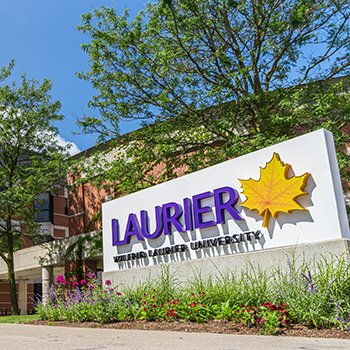Search for academic programs, residence, tours and events and more.
The Sun Life Financial Centre for Physically Active Communities is a community outreach program that aims to improve activity levels and the overall health of youth within our community.
The Manfred and Penny Conrad Institute for Music Therapy Research and the Laurier Centre for Music in the Community focus on the healing effects of music at the individual and community levels.
The Manulife Centre for Community Health Research examines social determinants of health through a variety of community-based research projects.
This interdisciplinary field examines cognitive development, socio-emotional well-being and physical health from childhood to old age. It addresses the unique challenges of different life stages, including theories of death and dying, well-being in educational and workplace settings, and aging in rural environments.
Researchers examine how individuals and communities can maintain or quickly return to a state of well-being despite facing significant hardship, adversity or stress. It explores the development of resilience from infancy through young adulthood and how it is reinforced by healthy environments in schools, communities and workplaces.
Recognizing the critical importance of employee well-being within organizations, workplace health and well-being research focuses on understanding the individual and contextual factors that influence the physical, social and psychological health of employees.
This research area delves into the molecular and chemical mechanisms underlying health and disease in humans, animals and plants. Key research areas include toxicology, biotechnology, cellular processes, therapeutic development, stress resilience, and mechanisms of disease prevention and progression.
Research in this area focuses on user experience design and the development of applications based on modelling human performance. This strength also explores the psychological, social and health impacts of technology use among specific user groups, including Northern Indigenous communities, children and seniors.
Through examination of various disabilities and neurodevelopmental conditions across the lifespan, this research explores disability policy and practice, the impacts on caregivers and the provision of disability services. It also delves into the histories and lived experiences of individuals with disabilities and focuses on advocacy.
Music therapy research examines the clinical use of music to address physical, emotional, cognitive and social needs, aiming to enhance therapeutic practices. Research about music as a social practice investigates its role in community contexts, cultural reclamation, intercultural work, and decolonial and Indigenous ways of knowing and being.
The fields of social work and education can achieve long-term sustainability through meaningful partnerships with the business and not-for-profit sectors. By leveraging expertise in crisis management, mental health issues in workplaces and schools, inclusion, equity, diversity, and gendered and sexual violence, researchers can address complex societal challenges and promote well-being.
Research at Martin Luther University College focuses on strengthening people’s connections with one another and attends to the whole person, encompassing physical, relational and spiritual well-being. By fostering deeper connections and addressing multiple dimensions of health, researchers promote a more holistic approach to individual and community health.
Laurier is home to a unique diversity of high-level behavioural testing and monitoring approaches for comparative studies of cognition, natural behaviour and neural systems. Research focuses on social dynamics, spatial processing and reinforcement behaviours, contributing valuable insights into neural systems and their evolutionary contexts.


